Unit 7 Careers Viewing Workshop(共18张,内嵌视频)2024-2025学年高二英语北师版(2019)选择性必修3
文档属性
| 名称 | Unit 7 Careers Viewing Workshop(共18张,内嵌视频)2024-2025学年高二英语北师版(2019)选择性必修3 |

|
|
| 格式 | pptx | ||
| 文件大小 | 565.2MB | ||
| 资源类型 | 教案 | ||
| 版本资源 | 北师大版(2019) | ||
| 科目 | 英语 | ||
| 更新时间 | 2025-05-01 16:42:43 | ||
图片预览

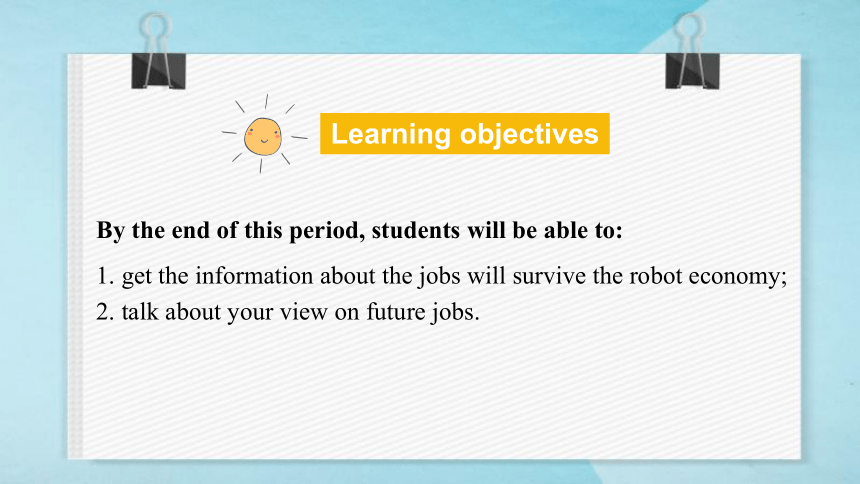
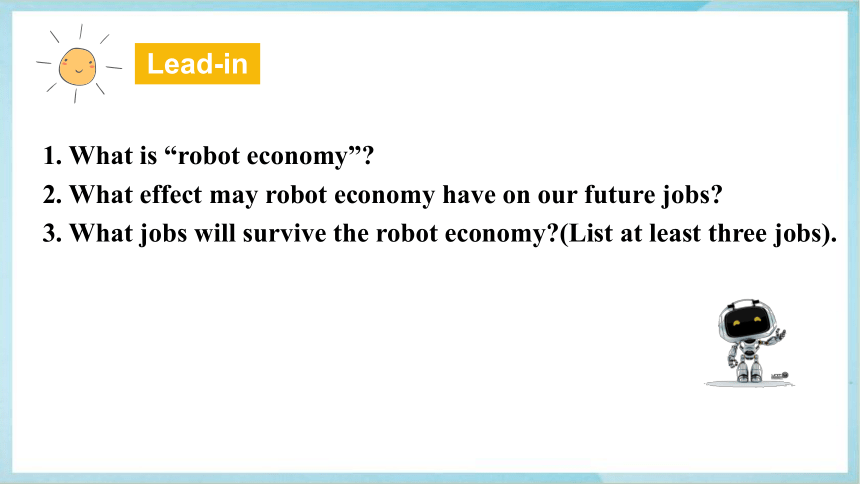

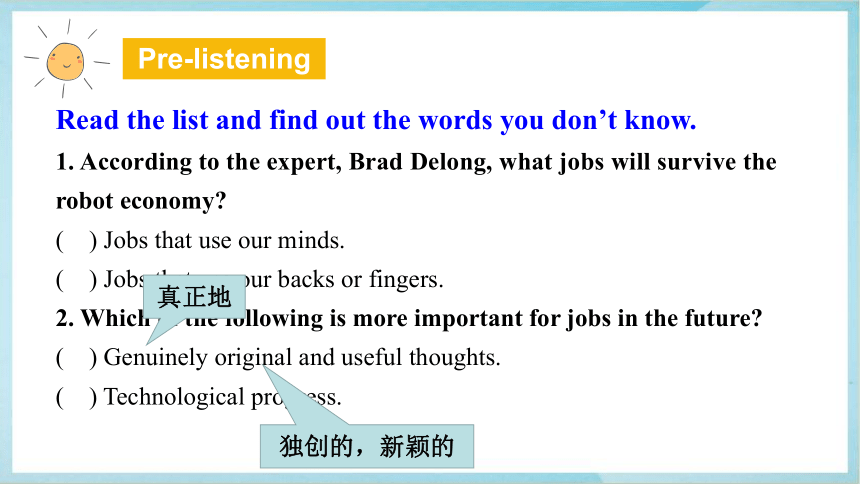
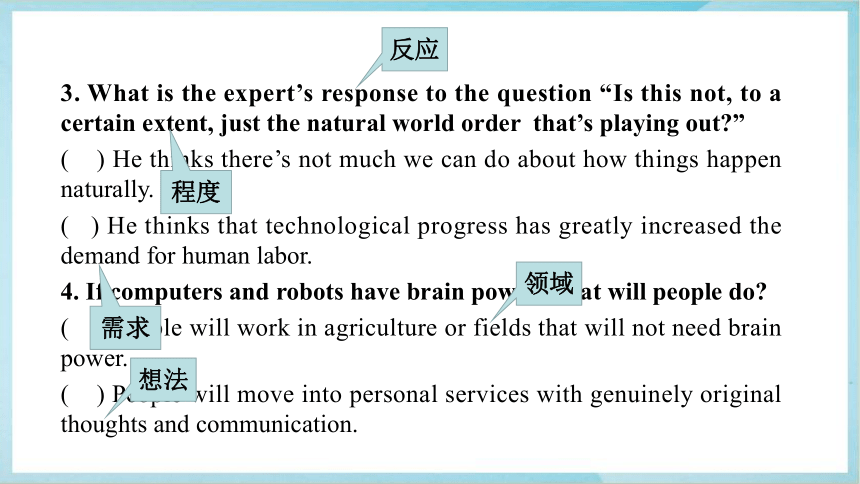
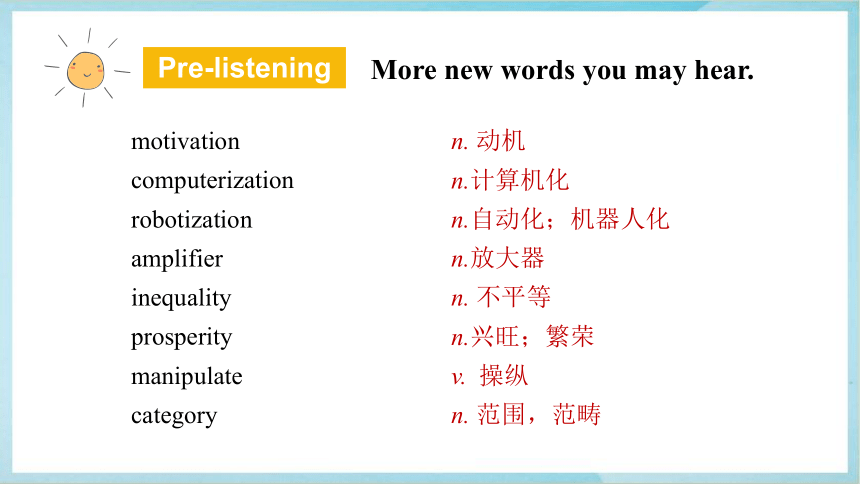
文档简介
Unit 7 Careers
VIEWING WORKSHOP
WHAT JOBS WILL SURVIVE THE ROBOT ECONOMY?
By the end of this period, students will be able to:
1. get the information about the jobs will survive the robot economy;
2. talk about your view on future jobs.
Learning objectives
1. What is “robot economy”?
2. What effect may robot economy have on our future jobs?
3. What jobs will survive the robot economy?(List at least three jobs).
Lead-in
Read the list and find out the words you don’t know.
1. According to the expert, Brad Delong, what jobs will survive the robot economy?
( ) Jobs that use our minds.
( ) Jobs that use our backs or fingers.
2. Which of the following is more important for jobs in the future?
( ) Genuinely original and useful thoughts.
( ) Technological progress.
真正地
独创的,新颖的
Pre-listening
3. What is the expert’s response to the question “Is this not, to a certain extent, just the natural world order that’s playing out?”
( ) He thinks there’s not much we can do about how things happen naturally.
( ) He thinks that technological progress has greatly increased the demand for human labor.
4. If computers and robots have brain power, what will people do?
( ) People will work in agriculture or fields that will not need brain power.
( ) People will move into personal services with genuinely original thoughts and communication.
反应
程度
领域
需求
想法
More new words you may hear.
motivation
computerization
robotization
amplifier
inequality
prosperity
manipulate
category
n. 动机
n.计算机化
n.自动化;机器人化
n.放大器
n. 不平等
n.兴旺;繁荣
v. 操纵
n. 范围,范畴
Pre-listening
eliminate
be stuck with
immense
furious
innovation
assemble
vulnerable
transition
remarkably
v. 消除;淘汰
被困住
adj. 极大的,巨大的;
adj. 狂怒的
n. 革新
v. 装配;聚集
adj. (身体或精神)脆弱的,易受伤的
n. 转变
adv.不寻常地
Pre-listening
More new words you may hear.
1. According to the expert, Brad Delong, what jobs will survive the robot economy?
( ) Jobs that use our minds.
( ) Jobs that use our backs or fingers.
2. Which of the following is more important for jobs in the future?
( ) Genuinely original and useful thoughts.
( ) Technological progress.
Watch the interview. Tick the correct options.
Watch the interview. Tick the correct options.
3. What is the expert’s response to the question “Is this not, to a certain extent, just the natural world order that’s playing out?”
( ) He thinks there’s not much we can do about how
things happen naturally.
( ) He thinks that techlogical progress has greatly
increased the demand for human labor.
4. If computers and robots have brain power, what will people do?
( ) People will work in agriculture or fields that will
not need brain power.
( ) People will move into personal services with
genuinely original thoughts and communication.
Check your answers one by one.
1. According to the expert, Brad Delong, what jobs will survive the robot economy?
( ) Jobs that use our minds.
( ) Jobs that use our backs or fingers.
√
2. Which of the following is more important for jobs in the future?
( ) Genuinely original and useful thoughts.
( ) Technological progress.
√
3. What is the expert’s response to the question “Is this not, to a certain extent, just the natural world order that’s playing out?”
( ) He thinks there’s not much we can do about how things happen naturally.
( ) He thinks that technological progress has greatly increased the demand for human labor.
√
4. If computers and robots have brain power, what will people do?
( ) People will work in agriculture or fields that will not need brain power.
( ) People will move into personal services with genuinely original thoughts and communication.
√
Watch the interview again. Answer the questions.
1. What can we do in the transition period we are in?
2. What countries does the expert mention in the interview?
Why does he mention them?
3. When machines have gained brain power during the robot
economy, what is the value of the human brain?
We’re either going to have to own the computer and the robots and so profit from them.
China and America, to mention factory jobs, and France, to mention history.
Employing a human is the only way that you can get the brain power that processes need.
Talk about the expert’s idea on robot economy using your mind maps. Compare if you have got all the information from the video.
speaking
Post-listening
What have you learnt about future jobs in the robot economy? What do you think of the expert’s idea? Prepare to give a presentation next class.
Homework
VIEWING WORKSHOP
WHAT JOBS WILL SURVIVE THE ROBOT ECONOMY?
By the end of this period, students will be able to:
1. get the information about the jobs will survive the robot economy;
2. talk about your view on future jobs.
Learning objectives
1. What is “robot economy”?
2. What effect may robot economy have on our future jobs?
3. What jobs will survive the robot economy?(List at least three jobs).
Lead-in
Read the list and find out the words you don’t know.
1. According to the expert, Brad Delong, what jobs will survive the robot economy?
( ) Jobs that use our minds.
( ) Jobs that use our backs or fingers.
2. Which of the following is more important for jobs in the future?
( ) Genuinely original and useful thoughts.
( ) Technological progress.
真正地
独创的,新颖的
Pre-listening
3. What is the expert’s response to the question “Is this not, to a certain extent, just the natural world order that’s playing out?”
( ) He thinks there’s not much we can do about how things happen naturally.
( ) He thinks that technological progress has greatly increased the demand for human labor.
4. If computers and robots have brain power, what will people do?
( ) People will work in agriculture or fields that will not need brain power.
( ) People will move into personal services with genuinely original thoughts and communication.
反应
程度
领域
需求
想法
More new words you may hear.
motivation
computerization
robotization
amplifier
inequality
prosperity
manipulate
category
n. 动机
n.计算机化
n.自动化;机器人化
n.放大器
n. 不平等
n.兴旺;繁荣
v. 操纵
n. 范围,范畴
Pre-listening
eliminate
be stuck with
immense
furious
innovation
assemble
vulnerable
transition
remarkably
v. 消除;淘汰
被困住
adj. 极大的,巨大的;
adj. 狂怒的
n. 革新
v. 装配;聚集
adj. (身体或精神)脆弱的,易受伤的
n. 转变
adv.不寻常地
Pre-listening
More new words you may hear.
1. According to the expert, Brad Delong, what jobs will survive the robot economy?
( ) Jobs that use our minds.
( ) Jobs that use our backs or fingers.
2. Which of the following is more important for jobs in the future?
( ) Genuinely original and useful thoughts.
( ) Technological progress.
Watch the interview. Tick the correct options.
Watch the interview. Tick the correct options.
3. What is the expert’s response to the question “Is this not, to a certain extent, just the natural world order that’s playing out?”
( ) He thinks there’s not much we can do about how
things happen naturally.
( ) He thinks that techlogical progress has greatly
increased the demand for human labor.
4. If computers and robots have brain power, what will people do?
( ) People will work in agriculture or fields that will
not need brain power.
( ) People will move into personal services with
genuinely original thoughts and communication.
Check your answers one by one.
1. According to the expert, Brad Delong, what jobs will survive the robot economy?
( ) Jobs that use our minds.
( ) Jobs that use our backs or fingers.
√
2. Which of the following is more important for jobs in the future?
( ) Genuinely original and useful thoughts.
( ) Technological progress.
√
3. What is the expert’s response to the question “Is this not, to a certain extent, just the natural world order that’s playing out?”
( ) He thinks there’s not much we can do about how things happen naturally.
( ) He thinks that technological progress has greatly increased the demand for human labor.
√
4. If computers and robots have brain power, what will people do?
( ) People will work in agriculture or fields that will not need brain power.
( ) People will move into personal services with genuinely original thoughts and communication.
√
Watch the interview again. Answer the questions.
1. What can we do in the transition period we are in?
2. What countries does the expert mention in the interview?
Why does he mention them?
3. When machines have gained brain power during the robot
economy, what is the value of the human brain?
We’re either going to have to own the computer and the robots and so profit from them.
China and America, to mention factory jobs, and France, to mention history.
Employing a human is the only way that you can get the brain power that processes need.
Talk about the expert’s idea on robot economy using your mind maps. Compare if you have got all the information from the video.
speaking
Post-listening
What have you learnt about future jobs in the robot economy? What do you think of the expert’s idea? Prepare to give a presentation next class.
Homework
